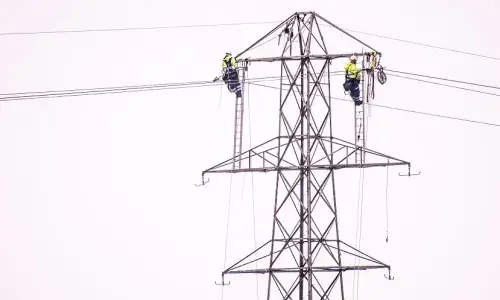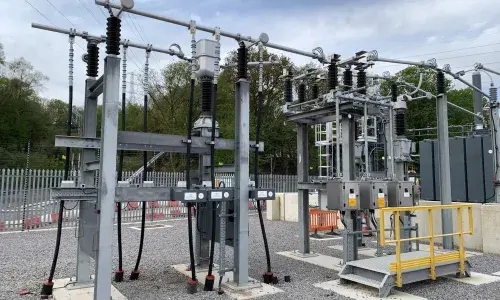
Why we need to rapid charge the roll-out of EV infrastructure on our main roads
Government’s recent Powering up Britain plans include welcome investment for thousands of local electric vehicle (EV) chargers across the country, and reaffirmed its commitment that all new cars and vans must be zero emission by 2035. But it’s the long-awaited Rapid Charging Fund that industry is keen for news on, writes National Grid’s transport decarbonisation expert Dr Russell Fowler.
Electric vehicles are good news for the energy transition and for clean air. When moving, they’re emission-free. When parked, they’re like batteries on wheels – they can soak up excess clean power from the grid, and avoid drawing energy at times of peak demand.
They can even discharge that green electricity back to the grid when needed via vehicle-to-grid technology, helping to balance the system smartly and cost-effectively.
These are scenarios National Grid ESO has been outlining for years, through its Future Energy Scenarios, as a way for EVs to support Britain’s zero emission vehicle mandate and legally binding target to decarbonise by 2050.
To fully realise those ambitions, more investment in charging infrastructure – particularly rapid charging – is needed to give confidence to EV drivers and, crucially, future EV drivers.
The Rapid Charging Fund can futureproof grid capacity for all road transport, including coaches and HGVs
Getting the right speed of chargers in the right place is essential to encourage consumers and businesses to make the switch. Research shows that once people feel confident there’s a visible and viable network of charging points in place, they’ll be more inclined to go electric.
We also know consumers will feel more comfortable buying an EV knowing that charging points are both widely available and fast. That means more than just a focus on home and street charging.
So while local initiatives like the government’s Local Electric Vehicle Infrastructure (LEVI) fund and On-Street Residential Chargepoint Scheme (ORCS) are very welcome, there’s a need for this to be connected with a fast network of chargepoints across our country’s strategic road network.
After all, everyone must go on a long journey at some point – some people every day, some people maybe only once a year. Both need a reliable fast charging network on our main roads to support them.
That’s where the government’s Rapid Charging Fund (RCF) – aka ‘Project Rapid’ – comes in. Three years ago the project committed £950 million to install rapid chargers at key motorway service areas (MSAs) along the whole of the strategic road network in England.
Its aim is to have at least six high-powered open-access charge points at each MSA across England by 2023, increasing to around 2,500 high-powered charge points across the country’s motorways and major A-roads by 2030, and increasing again to 6,000 by 2035.
Of course, this shouldn’t be for cars and vans alone. There’s an opportunity for Project Rapid to futureproof grid capacity for all road transport, such as coaches and HGVs. Our own research shows that road freight will require similar grid connections, and in similar locations, to those needed by cars and vans – and can be done much more cost effectively at the same time as for cars and vans.
Analysis: how expanding Project Rapid would accelerate the decarbonisation of all road transport
On a related note, it was good to see government publishing outcomes from its consultation on consumer experience at public charge points, which highlighted the need for inclusive design. This will be important in the need to rethink the user experience at MSAs – with a “charge while stopped” rather than “stop to charge” approach being central to the thinking behind and design of EV infrastructure.
The RCF is key to enabling transport and energy networks to put the right charging infrastructure in place. At National Grid we’re continuing to work with the Department for Transport (DfT) and Office of Zero Emission Vehicles (OZEV) in an effort, with the help of this fund, to enable them to get ahead of the curve and build the infrastructure the country needs.
We’re also working with Ofgem and industry to bring about the planning, regulatory and connections reform that will help deliver this decarbonised transport future.
An announcement of RCF pilot projects at key MSAs, and a consultation on the delivery of the £950 million fund, would be a welcome next step by government.
Progress on this project will help drive the economic, air quality and energy security benefits that electric vehicles are sure to bring as part of a clean, affordable whole energy system.


